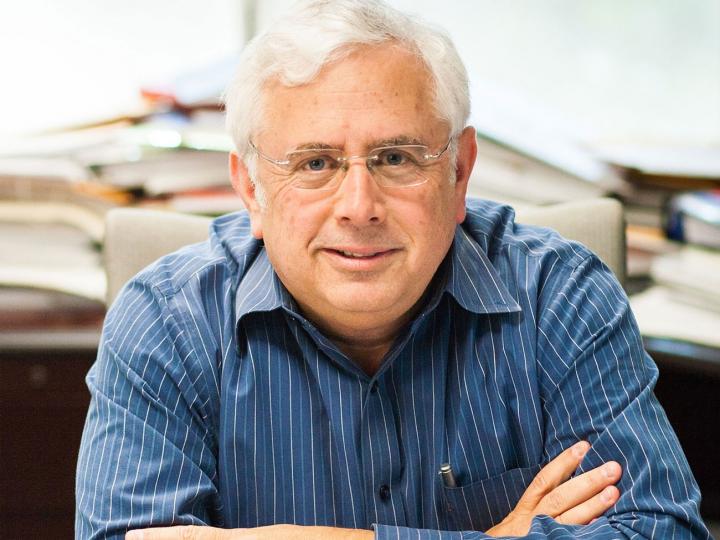
Credit: Sanford Burnham Prebys Medical Discovery Institute
LA JOLLA, CALIF. – March 19, 2021 – Scientists at Sanford Burnham Prebys Medical Discovery Institute have identified a drug candidate that blocks the uptake of glutamine, a key food source for many tumors, and slows the growth of melanoma. The drug is a small molecule that targets a glutamine transporter, SLC1A5, which pumps the nutrient into cancer cells–offering a promising new approach for treating melanoma and other cancers. The study was published in the journal Molecular Cancer Therapeutics.
“While great strides have been made recently in the treatment of melanoma, many patients’ tumors become resistant to therapy, and this has become a major obstacle in the successful treatment of the disease,” says Ze’ev Ronai, Ph.D., director of the National Cancer Institute (NCI)-designated Cancer Center at Sanford Burnham Prebys and senior author of the study. “This study describes a promising compound that selectively targets the uptake of glutamine, an amino acid nutrient that tumors rely on for survival. We are hopeful this drug will fill an unmet medical need for people living with this deadly cancer.”
More than 7,000 people die from melanoma each year in the U.S., according to the American Cancer Society, and cases continue to increase annually. In the past decade, immunotherapy and personalized treatments have extended survival times for many patients. However, because of the high incidence of cancer recurrence, scientists are increasingly focused on therapeutic strategies to prevent relapse and increase overall survival.
“This is a very important study because many targeted drugs for melanoma treatment have been significantly hindered by the rapid development of treatment resistance, sometimes as quickly as within several months. While immunotherapy approaches are promising, they are only effective in a subset of patients, and treatment resistance can also develop in this setting as well,” says M. Celeste Simon, Ph.D., Arthur H. Rubenstein, MBBCh Professor in the department of Cell and Developmental Biology and scientific director of the Abramson Family Cancer Research Institute at the Perelman School of Medicine at the University of Pennsylvania. “The drug candidate identified in Dr. Ronai’s study offers an exciting new therapeutic approach for treating tumors addicted to glutamine, which includes a long list of human cancers, and will hopefully lengthen the amount of time that people with melanoma respond to available treatments.”
Blocking the tumor’s food supply
Researchers know that rapidly growing tumors are able to reprogram their metabolism to generate extra energy to survive and grow. Tumors often achieve this by pumping increasing levels of the amino acid glutamine into their cells, primarily through a pump called SLC1A5. As a result, cancer researchers are working to find drugs that block SLC1A5 and reduce glutamine levels.
In the study, Ronai and his team set out to identify drug(s) that can inhibit glutamine uptake. Working in collaboration with researchers at the Institute’s Conrad Prebys Center for Chemical Genomics, the scientists screened 7,000 diverse compounds for their ability to interfere with SLC1A5. This work identified about 20 hits, or promising options, and one was selected based on its superior ability to prevent SLC1A5 from reaching the cell membrane. This drug candidate, IMD-0354, inhibited tumor growth in both cell culture and in mice with melanoma.
“Our study shows that targeting SLC1A5, which stops glutamine from ever entering the cell in the first place, is an effective way to slow cancer cell growth,” says Yongmei Feng, Ph.D., staff scientist in the Ronai lab at Sanford Burnham Prebys and first author of the study. “Because many tumor types are dependent upon glutamine for survival, this drug may be able to treat many different types of cancers.”
As a next step, Ronai and his team will further refine IMD-0354, with a focus on improving biophysical properties that will help accelerate preclinical evaluation of the drug candidate.
###
Additional study authors include Gaurav Pathria, Susanne Heynen-Genel, Michael Jackson, Brian James, Jun Yin and David A. Scott of Sanford Burnham Prebys. The study’s DOI is 10.1158/1535-7163.MCT-20-0354.
Research reported in this press release was supported by the National Institutes of Health (NIH) (R35CA197465, P30CA030199), the Department of Defense (DoD) (CA1810216), and the Melanoma Research Alliance (509524).
About Sanford Burnham Prebys Medical Discovery Institute
Sanford Burnham Prebys is a preeminent, independent biomedical research institute dedicated to understanding human biology and disease and advancing scientific discoveries to profoundly impact human health. For more than 40 years, our research has produced breakthroughs in cancer, neuroscience, immunology and children’s diseases, and is anchored by our NCI-designated Cancer Center and advanced drug discovery capabilities. For more information, visit us at SBPdiscovery.org or on Facebook at facebook.com/SBPdiscovery and on Twitter @SBPdiscovery.
Media Contact
Susan Gammon
[email protected]
Original Source
https:/
Related Journal Article
http://dx.




